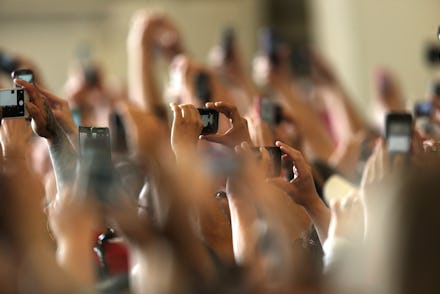A New Study Links Cell Phones to Cancer in Rats. Does It Matter?

The debate as to whether or not our cell phones can kill us has been going on for years, and we still aren't totally sure what the answer is. But new research leans toward a grim outlook.
The study: The National Toxicology Program discovered a link between the type of radiation emitted from cell phones and cancer in rats. The study, which has been underway for over a decade and cost a whopping $25 million, exposed more than 2,500 rodents to the same type of radiation found in cell phones, Yahoo News reported.
The rodents were exposed at the same frequencies for nine hours every day over the course of two years. The researchers found that the male rodents experienced two types of tumors — malignant gliomas in the brain and schwannomas of the heart, according to the study. The occurrence of these tumors was "low" but they appeared, nonetheless, according to the study.
Previous studies: The types of tumors observed in this study are similar to previous epidemiology studies of cell phone use, the study notes, and are also what prompted the International Agency for Research into Cancer to classify radiation given off by mobile phones as "possibly" causing cancer in humans in 2011, Cancer Research U.K.'s Science Blog reported.
That was just four years after the first iPhone was unveiled and 38 years after the first-ever mobile phone was produced. The fairly recent introduction of mobile phones is why it has historically proven difficult to definitively pinpoint whether or not cell phones can cause cancer in humans.
"Because many cancers are not detectable until many years after the interactions that led to the tumor, and since mobile phones were not widely used until the early 1990s, epidemiological studies at present can only assess those cancers that become evident within shorter time periods," according to the World Health Organization.
But the new findings from the U.S. National Toxicology Program support the IARC's verdict back in 2011 that cell phones are a potential carcinogenic threat to humans.
They do contradict a recent study from the University of Sydney School of Public Health that looked at the rate of brain cancer in Australia from 1982 to 2012 compared to cell phone usage in the country from 1987 (when cell phones were introduced in Australia) to 2012. The results showed that brain cancer among Australian men only grew "slightly" compared to "stable" rates among women.
While we still can't definitively say if your iPhone is going to give you brain cancer, the new findings from the National Toxicology Program suggest that more research needs to be done.
The Imperial College of London is currently studying how mobile phones are impacting the health of 290,000 participants across five European countries. These findings could prove hugely valuable in the debate as to whether our cell phones are deadly.
If the answer is yes — the biggest question looms: Would we stop using them?
The future of cell phones: According to Pew Research Center, 35% of U.S. adults had a smartphone in 2011 — this is the year the IARC declared cell phones as potentially cancerous. In 2015, that number jumped to 68%. In 2004, 65% of Americans owned a cell phone. In 2015, that number catapulted to 92%.
If we compare cell phone habits to smoking cigarettes, the end is nigh for nomophobes. Smoking cigarettes is the leading cause of preventable disease and death in the U.S., according to the Centers for Disease Control and Prevention, and roughly 1 in 6 American adults still smokes.
It appears most Americans don't give a rat's ass (or brain or heart) when it's between their health and a deadly habit.